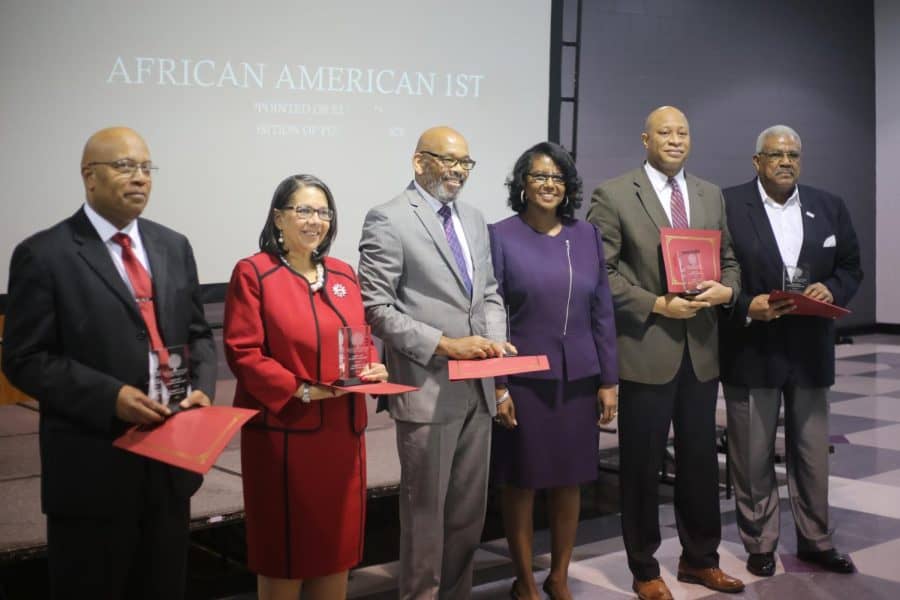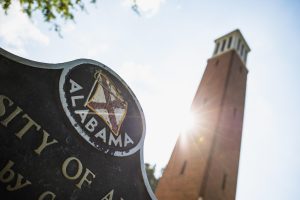Community honors local civil rights pioneers
February 25, 2019
In a building named for a Tuscaloosa champion of African-American education, on a street named for a champion of minority rights, leaders from the black community gathered to honor heroes from the past and present.
Several events took place on campus, like The Blackout, which featured slam poetry readings and a social justice-themed creative workshop. “A Night of Heritage and a Taste of Soul,” a celebration of international music and cuisine, was held Friday night at Tuscaloosa Career & Technology Academy.
The “Honoring Our Trailblazers” breakfast was history-focused with an emphasis on the progress of equality. The Rev. T.Y. Rogers Award, named for Tuscaloosa’s most prominent civil rights leader, was presented to several outstanding community members. Rogers’ family was also given an award honoring his leadership in the local desegregation movement.
“For us to be able to shape a brighter future, we have to honor and understand our past,” Mayor Walt Maddox said. “In Tuscaloosa’s history, from the beginning, we failed to amend America’s original sin of slavery. Today is about honoring those who have risen above injustice to make Tuscaloosa a better place. … It’s a point of pride that as a community we chose unity over division, and today is a celebration of that.”
The Tuscaloosa Civil Rights History Task Force announced the creation of a local civil rights trail downtown. Guidebooks with a detailed history for each of the 18 stops were given to the event’s attendees as a “soft opening” for the project. The trail is expected to officially open with informational markers by May 1.
The trail has been in development for two years, Task Force President Scott Bridges said. A team of contributors, designers and editors worked to research the locations and provide a historical picture that is as accurate as possible.
“When you look in this document, you’ll see T.Y. Rogers everywhere,” Bridges said. “He’s at the courthouse march, he’s leading the boycotts downtown, he’s involved in the Druid Transit Company affair. He really brings to a head the frustrations of segregation that were felt over many, many decades in 1964.”
UA instructor Billy Field, a contributor to the civil rights trail, presented a student-made short film about Bloody Tuesday. Led by T.Y. Rogers, a peaceful march from First African Baptist Church to the county courthouse was violently broken up by the Tuscaloosa Police Department on June 9, 1964. The film featured firsthand accounts of the march that left 33 men, women and children hospitalized and 94 arrested, more than Selma’s Bloody Sunday.
The UA Afro American Gospel Choir was one of five groups to sing for the morning’s program. Other choirs were present, representing Greene County High School, Central High School, Paul W. Bryant High School and Stillman College. The event closed with a combined chorus performance of “Lift Every Voice and Sing,” often referred to as “the black national anthem.”
“I think it’s important that music is honored during this festival,” said choir member Jacob Orr, a junior majoring in telecommunication and film. “The choir is the second-oldest black organization on campus, founded in 1971. So we’re trailblazers in our own right, and it’s very important that music is a part of our legacy.
G. Christine Taylor, vice president and associate provost for Diversity, Equity and Inclusion at the University, was the keynote speaker. She brought her own sense of humor and perspective to the speech, citing quotes from both Martin Luther King Jr. and Marvin Gaye.
“We are here because of benefactors, trailblazers of the past,” Taylor said in her keynote address. “We must reap what they have sown, and we cannot squander the opportunities they have given us. … One must name oneself, define oneself and create oneself, rather than be named, created or defined by ‘the other.’”
While the event focused on Tuscaloosa’s history, each speaker emphasized the need for continued progress.
“There’s still so many social justice issues that need to be conquered,” Maddox said. “If you look across Alabama, whether it’s Uniontown or Eight Mile, we see the environmental injustice still prevalent. Our failure to expand Medicaid has acutely impacted African-Americans in our state. There’s so many issues we need to work on. Events like today give us a platform celebrate not only what we’ve accomplished, but also to understand there’s a lot of work to be done.”





















